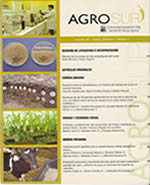Effect of early acclimatization on blood metabolites in broilers
Main Article Content
Abstract
Evaluated the effect of early acclimatization in blood metabolites and productivity during the stage of completion of broilers (Gallus gallus domesticus L.). We used three hundred ninety six chickens a day of the Cobb 500 line, randomly assigned into three treatments: T1, birds acclimated to the 5, 10 and 15 days of those exposed 6 hours at temperatures between 38 and 40 °C, T2, birds acclimated on day 5, with a 24 hours exposure at temperatures between 38 and 40 °C. T3, birds without acclimatization. Determined: metabolites in blood (glucose, urea nitrogen, creatinine, cholesterol, triglycerides, magnesium, calcium and phosphorus). Blood samples were performed collected at the 38 and 45 days of age. Acclimation does not affect (p>0.05) the variables: glucose (38 days), calcium, phosphorus, magnesium, cholesterol and triglycerides (45 days); cholesterol and phosphorus (38 days) was lower (p<0.05) in all the treatments. Treatments with acclimatization early (without taking into account the heat index) adversely affected the phosphorus and positively cholesterol and glucose levels. If levels of magnesium, calcium, triglycerides, remained constant despite the treatments. Creatine and urea nitrogen, had low values in all evaluated groups. Treatment of acclimatization which offered the best results was carried out the five day with 24 hours of exposure.

